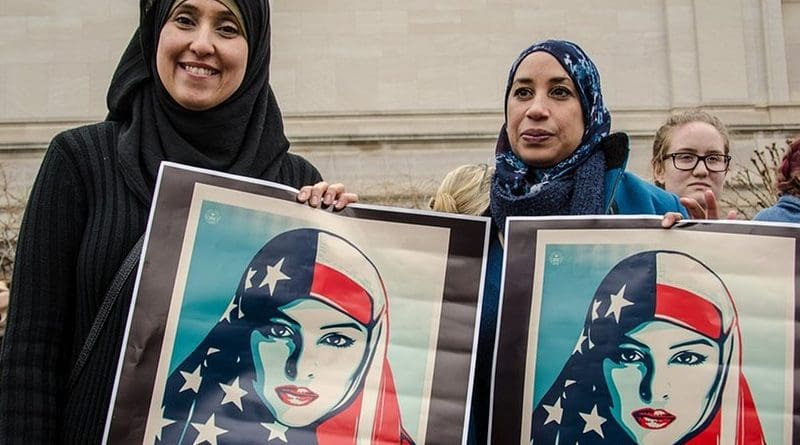Remembering Those Killed In The 9/11 Backlash – OpEd
By Ray Hanania
On Saturday, Americans will remember the 2,996 people killed in the Al-Qaeda terrorist attacks on Sept. 11, 2001. They will mourn them, recall their lives, and remember the events of that horrific day. But few will spend any time remembering the dozens of Americans who were killed in the weeks and months after 9/11 in backlash violence that targeted people who “looked” Middle Eastern or were Muslim.
The tragic tales of these victims have never been fully told or acknowledged by the American people. In many cases, the police and judicial system seemed reluctant to connect their murders to 9/11, despite the fact that the federal government later acknowledged a sharp rise in anti-Arab and anti-Muslim discrimination and violence.
Anger and racism prevents many Americans from accepting the fact that the murders were tied to 9/11, because the victims were Muslim or “Middle Eastern-looking” Pakistanis, Sikhs or Hindus. They have never been included in the commemorations for that tragic event. But every single one of the backlash victims should be recognized when Americans pause to remember the terrorist attacks on Saturday.
Two of the perpetrators openly bragged about wanting to avenge the deaths of those who died on 9/11, and their cases were officially acknowledged as being linked to the attacks. But, in a shocking display of ignorance, few of the victims were actually Arab — the declared description of the 9/11 terrorists.
Here are some of the cases that should be remembered.
Balbir Singh Sodhi was murdered on Sept. 15, 2001, in Mesa, Arizona. The turban-wearing Sikh was killed outside his gas station by a man who had spent hours drinking at a bar, bragging that he planned to “go out and shoot some towel-heads.” The killer was Frank Silva Roque, 42, a Boeing aircraft mechanic at a local repair facility with a criminal record that included an attempted robbery in California. Roque was arrested, convicted and sentenced to death by an American court, but his death sentence was later commuted to life imprisonment.
The day after Sodhi was murdered, another American man enraged by the 9/11 terrorist attacks began a violent rampage, killing two people and seriously injuring another. Mark Stroman, a white supremacist from Texas, first attacked and killed Waqar Hasan in Dallas. The 46-year-old Pakistani was working in his convenience store when Stroman shot him dead.
Five days later, Stroman entered a gas station in Dallas, where he encountered 28-year-old cashier Rais Bhuiyan, who was a former Bangladesh Air Force pilot. After asking where he was from, Stroman shot Bhuiyan in the head with a shotgun, partially blinding him.
On Oct. 4, Stroman drove to a gas station in nearby Mesquite, where Hindu Indian Vasudev Patel, 49, worked. Patel had emigrated to America in 1983 and was a naturalized US citizen. Stroman shot Patel dead and fled after failing to forcibly open the cash register.
Stroman was caught the next day and told police he did “what every American wanted to do,” saying America was “at war.” He was convicted of murder and executed in July 2011. Bhuiyan, the only survivor of Stroman’s killing spree, tried in vain to stop the execution, citing his Muslim faith for forgiving his attacker.
These cases were identified as being related to 9/11 because the attackers acknowledged the source of their rage. But many other crimes that took place in the weeks following the attacks were never classified as hate crimes and the victims were never associated with the post-9/11 backlash.
Adel Karas, 48, a grocer from Egypt and a Coptic Christian, was killed on Sept. 15, 2001, in his San Gabriel, California, store. Although several suspects were identified, prosecutors declined to press charges, saying there was insufficient evidence.
Ali Almansoop, a Yemeni-American citizen and father of four, was murdered two days later in his Detroit, Michigan, home. Prosecutors charged Brent David Seever with first-degree murder and he was sentenced to life in prison. Although Seever reportedly claimed he was glad he shot the victim because of 9/11, police decided it was a domestic dispute over a woman.
Jawed Wassel, of Queens, New York, was an Afghan-American director who had just finished a film about Iraq when he got into a dispute with one of the film’s investors. The investor was later charged with murdering Wassel and dismembering his body in the days after Sept. 11. He admitted murder and was sentenced to 25 years in jail.
Father-of-eight Abdo Ali Ahmed, 51, was murdered two days after he found a note on his car deriding his ethnicity and threatening to kill him. Ahmed, a Yemeni shopkeeper in Reedley, California, showed the note to friends and family but threw it away after concluding the threat was little more than typical post-9/11 rage. He was murdered on Sept. 29, 2001. Police have never charged a suspect in the case.
Abdullah Mohammed Nimer, 53, was a door-to-door salesman who lived and worked in Los Angeles. Police described his October 2001 murder as “a simple robbery,” but when his body was found his car was unlocked and filled with merchandise worth thousands of dollars. Police also found several hundred dollars in cash with the victim. No one has ever been charged.
As America prepares to mark the 20th anniversary of 9/11, the commemorations would have a more powerful meaning if these victims were also memorialized. The terrorist attacks were horrendous acts of terror that took thousands of lives on a single day, but they also took many more American lives in the weeks and months that followed.

